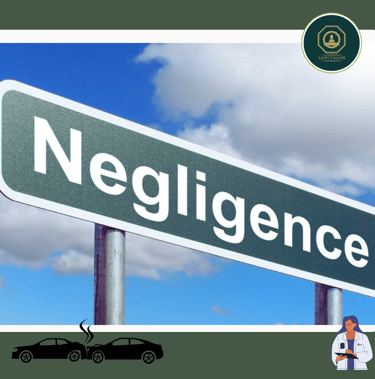Negligence
This blog post explains the concept of negligence, civil and criminal negligence, its key components, essential features and remedies available to defendants. Additionally, essential case laws and illustrations are also mentioned.
Shreya from Institute of Law, Kurukshetra University
6/6/20245 min read


Negligence
WHAT IS NEGLIGENCE?
Negligence generally refers to the failure to take reasonable care or to act in a manner that a reasonable person would in a similar situation. In legal terms, negligence means the failure to fulfil the standard of care that is expected in a particular circumstance, resulting in harm or injury to another party.
As per Jacob Mathew V. State of Punjab {1},
1) Negligence is the breach of duty caused by the omission to do something that a reasonable man would do, or doing something that a reasonable and prudent man would not do.
2) Negligence consists of the neglect or the use of ordinary care or skill towards other persons and this neglect results in some damages or injuries to the other person.
CIVIL NEGLIGENCE AND CRIMINAL NEGLIGENCE
Negligence can lead to legal consequences under both civil and criminal law. Civil Negligence occurs when a person fails to act with ordinary care. It is measured on the basis of how a reasonable man would act in a similar situation. Criminal Negligence involves acts of extreme negligence that could lead to death or grievous harm.
In the case of civil negligence, the extent of liability depends upon the amount of damages suffered while in the case of criminal negligence, the extent of liability depends upon the degree and amount of negligence. The Apex Court in Jacob Mathew V. State of Punjab considered mens rea as the essential element of criminal negligence.
ESSENTIALS OF NEGLIGENCE
Duty of care to the plaintiff
The defendant must have a specific duty towards the plaintiff. Duty doesn’t mean moral, religious or social duty, it means legal duty.
The plaintiff has to prove that the defendant owed certain legal duty towards him and he breached the same.
As in Donoghue V. Stevenson {2}, a man purchased a bottle of ginger beer for his lady friend from a retailer. She consumed the same beer. The beer contained the decomposed body of a snail because of which she suffered in her health. She brought an action against the manufacturer. The court held the manufacturer liable for negligence and stated that the manufacturer owed a duty of care to the plaintiff that the bottle contained no harmful matter.
The duty towards the plaintiff depends on reasonable foreseeability of the injury. As stated in Mysore State Road Transport Corporation V. Albert Dias {3}, care that is required to be taken in a certain situation depends upon the obvious risk that must have been to an ordinary prudent man.
Breach of duty
Breach of duty refers to the failure to exercise due care required in a specific situation. If the defendant acted as a reasonable person, there is no breach of duty.
As in a case, the plaintiff, a co-pilot, during his layover period, stayed at the Hotel, which was owned by the defendants. The hotel had a swimming pool with a defective design. While at the swimming pool of the hotel, the plaintiff hit his head on the bottom and suffered serious injuries. The plaintiff brought an action against the defendant. The court held the defendant liable for negligence as the defendant owed a duty of care towards the plaintiff and he failed to exercise this duty. The hotel did not take reasonable care towards the plaintiff. [ Klaus Mittelbachert V. East India Hotels Ltd.] {4}
Damage
It is essential for the plaintiff's case that the defendant's breach of duty directly results in damage to the plaintiff. The plaintiff is responsible for proving that the specific damage was caused by the defendant's breach of duty. If the damage is too remote, then the defendant cannot be held liable.
As per the general rule, it is the duty of the defendant to provide evidence of the negligence by the defendant. But in some cases, no direct evidence of negligence is necessary as the negligence may inferred from certain circumstances. This legal principle is known as Res Ipsa Loquitur. It means things speak for itself. It is a legal theory wherein the facts or circumstances surrounding injury allow the court to presume that negligence has occurred.
Other essentials of negligence
It is necessary that the defendant was in exclusive control of the situation. If he had no such control, then he cannot be held liable.
The damage caused to the plaintiff would have been an ordinary occurrence. If the damage is extraordinary that cannot be foreseen the defendant has no liability.
The plaintiff’s injury was not because of his own actions. In such a case plaintiff will be held liable for contributory negligence.
REMEDIES AGAINST NEGLIGENCE
Contributory Negligence
Contributory negligence occurs when both parties are negligent and can be used as a defence by the defendant. Contributory negligence is a legal concept that arises when both the plaintiff and the defendant are found to be at fault for an incident. In such cases, the defendant can use contributory negligence as a defence. If it can be shown that the plaintiff's own negligence contributed to the incident, the defendant may not be held fully liable.
As in Butterfield v. Forrester {5}, the defendant wrongfully obstructed a highway by putting a pole across it. The plaintiff, who was riding violently in twilight on the road collided against the pole and was thrown from his horse and injured. If the plaintiff himself have taken reasonable care, then he can avoid the accident. Hence, it was held by the court that the plaintiff had no cause of action as he himself could have avoided the accident by exercising due care.
Act of God
In cases of negligence, the defendant has the option to use the Act of God defence. This defence centers around extraordinary circumstances caused by natural forces that make it challenging for an ordinary prudent individual to exercise reasonable care towards others. An Act of God may include natural events such as earthquakes, floods, or other unavoidable incidents that are beyond human control.
Inevitable Accident
An inevitable accident refers to an unforeseen injury that, despite the defendant's exercise of due care, could not have been foreseen or prevented. So, in negligence, if the defendant has taken reasonable care on its own part and some damage is caused to the plaintiff because of an unavoidable circumstance then the defendant cannot be held liable.
As in a case, the defendant, who was the tenant in the premises of the plaintiff, complained to the landlord regarding the repair of electric wiring in the premises but the landlord did nothing. Soon after a few days of making the complaint, an accidental fire occurred on the premises due to a short circuit in the electric connection. The landlord filed a suit of negligence against the tenant. But it was held by the court that there was no negligence on the part of the defendant as reasonable care was taken by him and the fire accident was a case of inevitable accident. [Assam State Corporation, etc. Federation Ltd. V. Anubha Sinha] {6}
CONCLUSION
Negligence, a pivotal concept in both civil and criminal law, is fundamentally about failing to exercise the care that a reasonable person would in similar circumstances, leading to harm. As highlighted in landmark cases such as Jacob Mathew v. State of Punjab and Donoghue v. Stevenson, negligence involves a breach of duty, resulting in damage to the plaintiff.
Negligence is crucial in holding people and organizations accountable for their actions. It ensures that when someone fails to act with the care expected in a situation, and this failure causes harm, they can be held responsible. Key aspects like duty of care, breach of duty, and resulting damage are essential to prove negligence. Defences such as contributory negligence and inevitable accidents provide a fair balance, acknowledging that not all harm can be foreseen or prevented.
Ultimately, negligence law promotes a safer and more responsible society by expecting individuals to act with due care and diligence. It serves as a reminder that our actions have consequences, encouraging us to act thoughtfully and carefully in our daily lives. This helps prevent harm and builds a more conscientious and safer society for everyone.
REFERENCES
{1} A.I.R. 2005 S.C. 3180
{2} (1932) A.C. 562
{3} A.I.R. 1973 Mysore 240, at 242
{4} A.I.R. 1997 Delhi 201, at 209, 210 (SINGLE JUDGE)
{5} (1809) 11 East 60
{6} A.I.R. 2001 Guwahati 18


